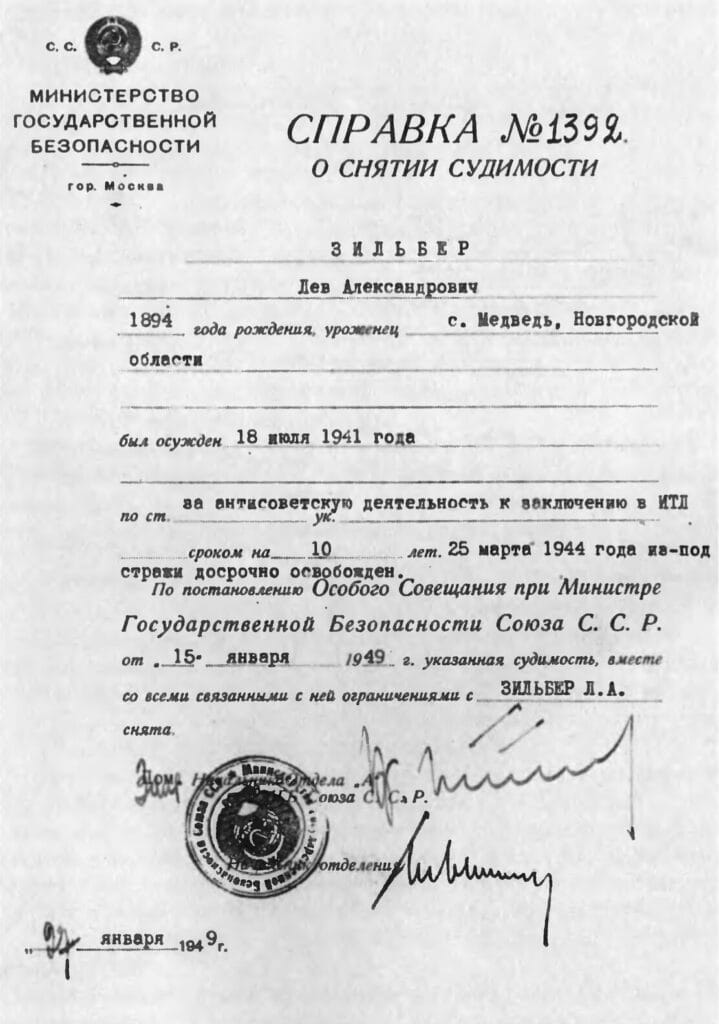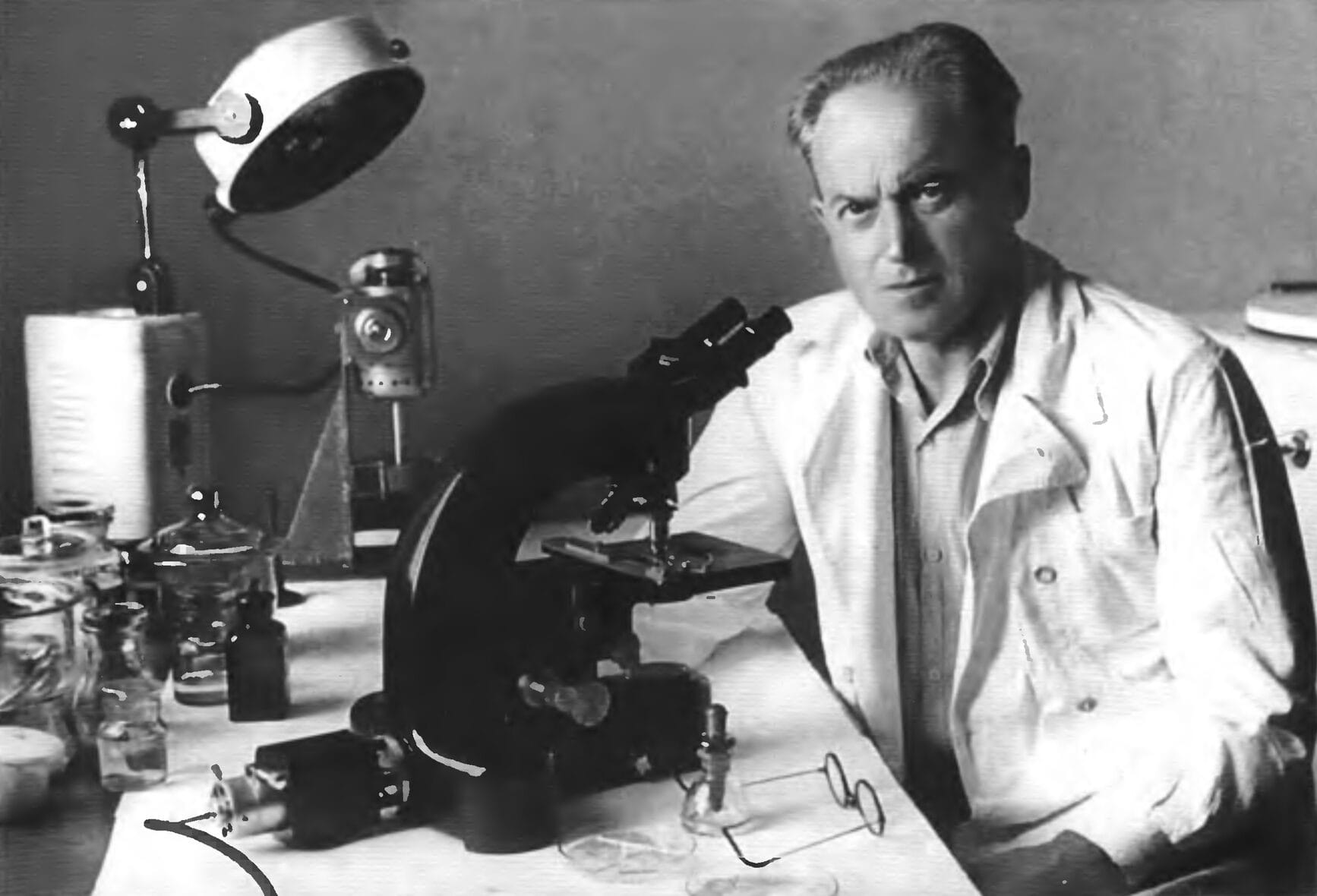There is a popular story on the Internet that Stalin, presenting the virologist Lev Zilber with a prize named after him, personally apologized to him for the arrest and camps. We have verified the accuracy of this information.
Many authors consider the story of Stalin’s apology to be the most striking detail in the biography of Lev Zilber, which is reflected in the headlines of articles about him: “Zilber, who defeated Stalin", "How Stalin asked for forgiveness", "Soviet scientist to whom Stalin personally apologized", etc. Texts about the confrontation between Zilber and Stalin especially popular on Facebook, where they recruit hundreds And thousands reposts. Most publications say that in 1945, “Stalin personally apologized to the scientist and presented him with a prize in his name,” while some claim that the apology was not made personally, but in a letter from the Soviet leader.
Lev Zilber - famous Soviet virologist and microbiologist, elder brother of the writer Veniamina Kaverina. He suppressed outbreaks of typhoid fever in Dzerzhinsk, plague - in Nagorno-Karabakh and smallpox - in Kazakhstan, studied tick-borne encephalitis. He was arrested several times, and was always accused of trying to secretly infect the population with these dangerous diseases. The first two arrests were short-lived - the scientist’s colleagues and friends managed to achieve his release in just a few months. However, the third time, in 1940, Zilber was nevertheless sent to the camps. At the same time, a collective work on encephalitis, in which he took part, was submitted for the Stalin Prize of the 1st degree, but Zilber’s name, of course, was not on the list of laureates.
In conclusion, Zilber was “lucky” - he gave birth to the wife of the head of the camp, after which he was removed from general work and appointed head of the infirmary (this story, with reference to oral stories of the scientist among his friends, is given in the book by L.A. Zilber’s son Lev Kiselyov and Elena Levina “Lev Aleksandrovich Zilber, 1894–1966: life in science"). So he was able to continue his scientific work - in particular, he invented a drug for pellagra (a disease developing from a lack of vitamins, which almost all prisoners suffered from) from the moss lichen (also known as “reindeer moss”), which grew in abundance in the tundra, and also found a way to make alcohol from the same moss. After this he was transferred from the camp to Moscow, to chemical sharashka (this is the colloquial name for prison-type research institutes and design bureaus in which imprisoned scientists, engineers and technicians worked).
In parallel, all this time, Veniamin Kaverin, Zilber’s ex-wife, creator of the first Soviet antibiotic Zinaida Ermolyeva and his numerous colleagues continued to fight for the scientist’s release. The book by Kiselyov and Levina contains the texts of several appeals they wrote to various authorities. However, Zilber himself considered the most important of them to be a letter addressed personally to Stalin. It was signed by nine Stalin Prize laureates, including academician Nikolai Gamaleya and chief surgeon of the Red Army Nikolai Burdenko. “The letter was transmitted to the Kremlin at 10 o’clock in the morning on March 21 [1944], and on the same day, at one o’clock in the morning, I was already free. It seemed clear that I was released by direct order of I.V. Stalin, the release documents apparently did not have time to be prepared yet,” wrote Zilber in memories. However, he then added: “Many years later I learned that this was not so. The letter from such prominent scientists caused a stir in the leadership circles of the then KGB. It was probably not clear how J.V. Stalin would react to him. What if they get it too? They decided to release the letter and not hand it over to Stalin. This version was told to me by one of the military prosecutors who was closely familiar with my case. But be that as it may, I was free."

Authors of the book “Lev Alexandrovich Zilber, 1894–1966: life in science” suggest that Nikolai Burdenko’s signature played a key role in the scientist’s release: “He enjoyed the full confidence of I. Stalin; in his office there was a “turntable” - a direct wire to Stalin, the Supreme Commander-in-Chief, with whom the chief surgeon of his army could contact almost at any time. <…> The fantastic haste with which Zilber was released can be explained by the fear of Beria; he knew that Burdenko could, on his own initiative, call the “turntable” and ask about Stalin’s reaction to the letter. Most likely, Stalin knew nothing at all about Zilber and his arrest, so the delivery of such a letter directly to Stalin, and even more so a possible call from Burdenko, could raise unwanted questions (“Why didn’t they agree?” or “Who ordered the arrest?”), so it was easier and safer to release Zilber from prison, which was done,” they write, clarifying, however, that this is “only an assumption, since the entire “operation” was to free Zilber was carried out, most likely, only through oral orders.”
This theory is indirectly confirmed by Kaverin’s testimony. In the essay "Big brother“He writes that on the envelope of that very letter, Zinaida Ermolyeva (who was the initiator of sending it) indicated “only one name: N.I. Burdenko. And this was a deliberate step, because the commander-in-chief cannot help but read the letters of the chief surgeon of the army - there is a general offensive on all fronts.”
Contrary to what the authors of online publications write, Zilber received the Stalin Prize not in 1945, but in 1946. In 1945 he published the monograph "Epidemic encephalitis"(it was mostly written between his second and third arrests in 1939–1940), for which he was awarded the Stalin Prize of the 2nd degree. Resolution this was about published June 27, 1946. The ceremonial presentation of diplomas and badges of honor to the prize winners took place on October 21, 1946. As a rule, Stalin Prizes in the field of science, military knowledge and invention handed over Chairman of the Prize Committee or his deputies, and this time was no exception. How reported on that day, “Evening Moscow,” “diplomas were presented by the deputy chairmen of the Stalin Prize committee S. V. Kaftanov, academician T. D. Lysenko and the scientific secretary of the committee, Professor K. F. Zhigach.” There is no information in the press of those years that Stalin was present at the ceremony.
An apology from Stalin would have been a fairly noticeable event in the scientist’s life, and information about it would probably have been preserved, if not in his own memoirs, then in conversations with his brother. However, they do not contain a single mention of personal meetings with the leader, or letters received from him. This story is not mentioned in the memoirs of Zilber’s friends and colleagues, collected in the book “Lev Aleksandrovich Zilber, 1894–1966: a life in science.” The earliest "Verified" reference to Stalin's apology to Zilber found in article in the Ukrainian magazine “Child Health”, published in the fifth issue for 2009. Unfortunately, the name of the author of this article is not indicated in the archive of journal publications.
Thus, evidence of Stalin’s apologies to Lev Zilber - both oral and written - was not preserved either in the memoirs of the scientist himself, or in his stories recorded by his brother, or in the memoirs of his colleagues and scientists. Moreover, Zilber himself (with reference to a certain military prosecutor) believed that Stalin did not even know about his imprisonment and release.
Cover photo: Zilber in the laboratory. Photo from the book “Lev Aleksandrovich Zilber, 1894–1966: life in science”
Read on topic:
- Is it true that penicillin was invented in the USSR?
- Is it true that encephalitis ticks were brought to the Far East by Japanese saboteurs?
- Is it true that Stalin organized the murder of Kirov?
- Did Vyshinsky call the confession of the accused the queen of evidence?
If you find a spelling or grammatical error, please let us know by highlighting the error text and clicking Ctrl+Enter.






